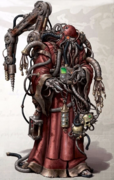|
I’ll admit I was going to avoid doing normal/upside down meanings as it felt like it’d be even more work 
|
|
|
|

|
| # ? May 2, 2024 18:15 |
|
Fidel Cuckstro posted:I’ll admit I was going to avoid doing normal/upside down meanings as it felt like it’d be even more work Yeah, if you were going to do the work of having individual events effects for each of the major arcana, having two for each seems like way too much on top of that. You could do something like, if they're used as a wild card you hang on to the card and they do something else later sometimes positive, sometimes negative kinda like the deck of many things because the players accidentally released a bit of wild magic out into the world. I wouldn't make it as disastrous as the worst of deck of many things, but it'd give you time to actually plan a thematic encounter. Although that would mean every ritual would work as long as they're willing to use the wild cards, and I feel like players will almost always go for that.
|
|
|
|
ActingPower posted:(Obligatory "Death means transformation, not literal death" post) It transforms you into a ghast
|
|
|
|
Air Skwirl posted:Yeah, if you were going to do the work of having individual events effects for each of the major arcana, having two for each seems like way too much on top of that. An idea I had was something like that. If I took Cantorsdust's resolution mechanic, I was imagining that each Major Arcana would have some sort of standard effect. Most negative but temporary. Maybe 1-2 of them would be positive. And the idea I'm thinking is that the Major Arcana causes the ritual to fail (activating the ritual's failure rules) BUT the player who drew the Arcana could opt to 'take the hit' of the Trump and be hit with that Arcana's particular effect. Most of the effects I'd try to loosely base on the reverse meaning of the Trumps. EX: Fool- Recklessness/Duped- The next time the PC enters combat their first action must be to charge towards the enemy, OR the next time an NPC has to make a deception check against the PC it automatically succeeds, whichever comes first. Justice- unaccountability/dishonesty- In the next day, the PC is compelled to lie about something. The PC is under reverse Liar Liar rules, and cannot confess the lie until after the day has ended. If the PC is not in a position to lie for a day, they take 5 + [PC level] of damage, which can be healed through any normal means. The GM is the final arbiter of when the day has passed. Hanged Man- stalling, needless sacrifice- For next day, any time the PC rolls initiative, they are moved to the bottom of the initiative order regardless of the results. The PC can end this curse by opting to use a free reaction to "needlessly sacrifice", triggered by an enemy hitting and damaging an ally. The PC can opt to take that damage + [PC level] in damage as a needless sacrifice. These might need to be tuned up a bit since I think most of them are no-brainers to take as a debuff, but basically they can't be so painful that it leads to players never casting a ritual.
|
|
|
|
Okay I'm still working on the tarot stuff but it's taking longer than expected. Mostly because 1) the tarot deck is more complicated than playing cards and 2) no one's really written a lot of stuff for tarot probability. I'm throwing up my notes so far and will come back to them: Okay, so I've been ruminating on this. For any probability based gaming system you want to have a resolution system that allows stepwise changes in probability so that you can adjust for ritual level, skill level, bonuses/penalties etc. To get a good stepwise probability function from discrete events you need to either: 1) Start with a high probability event and multiply it serially, decreasing probability each time. 2) Start with a low probability event and draw for it multiple times, increasing probability each time. I already suggested a good example of #1, start with drawing a minor arcana, and lower probability by making you draw more than once. The flip side of that would be #2, try to draw a major arcana, and increase probability by giving you more chances to draw one. This is, trivially, the inverse of example #1 but is a good example. Say you want a skill that increases probability of success as it increases. You could imagine for each level you get to draw 1 card, and if at least 1 of the cards drawn meets some criteria you succeed. This would give you a stepwise probability function based on the skill and the type of card you're trying to draw. f(skill level, card type) f(1, major arcana) = P1 = 22/78 f(2, major arcana) = P1 + P2 | ~P1 = 22/78 + (56/78)*(22/77) f(3, major arcana) = P1 + P2 | ~P1 + P3 | (~P1 and ~P2) = 22/78 + (56/78)*(22/77) + (56/78)*(55/77)*(22/76) or as a general rule, f(n, major arcana) = f(n-1, major arcana) + [22*56!*(78 - n)!] / [(56 - n + 1)!*78!] Let's look at those probabilities: f(1, major arcana) = 22/78 = 28.2% f(2, major arcana) = 38/78 = 48.7% f(3, major arcana) = 157/247 = 63.6% f(4, major arcana) = 917/1235 = 74.3% f(5, major arcana) = 2879/3515 = 81.9% f(6, major arcana) = 224159/256595 = 87.4% f(7, major arcana) = 46814/51319 = 91.2% f(8, major arcana) = 3422904/3643649 = 93.9% f(9, major arcana) = 3492281/3643649 = 95.8% f(10, major arcana) = 81432495/83803927 = 97.2% That's not a bad curve for something ranging from 1-5 or 1-6, but you can see diminishing returns past about 6 or so. In general, you have 2 levers for adjusting the curve. Either change the number of cards drawn, or adjust the probability of success for each card. Anyone who's played a Storyteller or Shadowrun game can tell you how this works. Note: if you haven't played one of these, I would recommend familiarizing yourself with their mechanics just because I think a lot of tarot mechanics would be similar to a dice pool + target difficulty system unless you get weird with it. I will say the general drawback to a system like this is that adding additional levers makes getting an intuitive feel for the curve hard. As a more general formula where you have a starting probability of p out of q cards (eg 22 major arcana of the deck of 78, or 16 face cards out of 78 or whatever): f(1, p, q) = p/q f(n, p, q) = f(n-1, p, q) + [p*(q-p)!*(q - n)!] / [((q-p) - n + 1)!*q!] This does work out in the simple case where p = 1 to be f(n, 1, q) = n/q The biggest drawback to this type of probability curve is that it has diminishing returns for higher levels of skill. No matter how you tweak the curve, the jump from 1->2 will be bigger than 2->3. The other problem is that the formula to calculate probabilities here is iterative. I made the table by plugging these into Excel but if I just wanted f(9, MA) it would be annoying to calculate. That also makes exploring the possibility space of f of n with condition with base fractional probability p/q eg f(n, p/q) more difficult to calculate. I've made a spreadsheet to calculate this simply, google sheets link here: https://docs.google.com/spreadsheets/d/11kOjzAkKtAqn7bRyu7O74mIgaBfMtp6dAyPvEI3zESE/edit?usp=sharing Other ways you could do it would be that to complete a ritual you have to collect at least p out of q suits of cards from a spread of n. Then you adjust difficulty either by changing the number of suits needed or again number of cards drawn. Let's additionally imagine that there are some number b of non-suit cards (like the major arcana) that don't count as any suit. Let's imagine a new function f(p, q, s, b, n) which is the chance to draw at least p types of suits from a deck with a total of q suits, s cards per suit, b non-suit cards, and n cards drawn. That's a lot of variables.
|
|
|
|
The party went really well -- they came up with entertainment that I never would have thought of, they mingled and got a reminder of the political factions involved, got a lot of questions answered, thought about who they would prefer to be in charge of Damaris. They heard that there was a meteor shower that night and maneuvered their ship to give a good view of the moon and the planet for the party. Then at the very end everyone gathered at the windows to watch the meteor shower. This was perfect timing with 15 minutes left in the session. First there was a meteor every five minutes, then every minute, then streaks across the sky every second... and then a bright flash from the moon! The navy people in the party instantly realized that the orbital defense station had started firing, and after a few seconds the crowd realized it too. The fire intensified, and then the short-range defense turrets opened up, and then they could see impacts on the planet's surface. After a few minutes of jammed vox channels and frantic attempts to figure out what was going on, the general pressed a data pad into the Rogue Trader's hand: the Imperial navy ship* had just jumped into the system and transmitted an all-channels warning of an imminent ork invasion. Too late! The invasion has started! And then we literally had two minutes left in the session and a bunch of players exclaiming about how was completely unexpected, a disaster unfolding, Damaris ruined for good, and then started wondering what this meant for the political struggle. Really happy with how this one went! Also really happy it ended on the cliffhanger, because we moved the session up two days to accommodate schedules and I have zero ork combats ready! *Usually stationed at Damaris with the captain they've met before, but recently out on patrol investigating increased xenos activity.
|
|
|
|
Magic, nice work gm.
|
|
|
|
That's cinematic as hell! The players will remember that moment for a long time.
|
|
|
|
Glad you got all the drama and a cliffhanger ending!
|
|
|
|
So now I have to try to balance out the different factions as this thing gets going, because later in the week I'll be getting the first combat ready. I was hoping to use this thread as a bit of a sounding board on balancing the factions so that they players have an interesting choice to make. Obvious choices aren't as interesting. 1. Captain Locke Captain Locke is the Imperial Navy commander of this outpost. As a navy officer she's going to assume that she's the ranking officer and therefore in overall command of the defense, and is going to get frustrated about the politics very fast. She's a skilled tactician and a good commander whose ship punches above its weight due to its well-trained and disciplined crew. Her presence is important to the space battle. Just as she pulls into port she'll receive strongly worded orders from the fleet to abandon the defense and return to base. She wants to disobey orders, but if the victory seems in doubt she'll leave. She wants to keep these orders secret for obvious reasons. She doesn't even entertain the thought that Damaris might secede from the Imperium, and if that happens she's going to leave as fast as possible to distance herself from the debacle. Strength Locke is the best tactician, and her ship is the most powerful space combatant. With her in charge the defense will have a better chance overall. She has only token ground forces to commit. Resources Locke is exceeding her orders even remaining here, and so has nothing to offer the players for siding with her. Relationship with the players Locke is going to attempt to commandeer the party's ships, which won't go over well with the party. However, she's also going to insist that the players' light cruiser be rushed into fighting shape to the exclusion of all other dock priorities. In her mind a second "real" warship is an invaluable tactical tool in this situation. And she's right, because a fleet battle is the finale to this module. The players will probably like the idea of getting their new cruiser operational in weeks rather than the months they expected. 2. Governor Kapak Kapak is the third son of a beloved but ineffectual governor, thrust into power by a tragic shuttle accident. He has been content to while away his tenure with social events, and turns to narcotics to lessen the burden of leadership. He prefers to leave governance up to the Imperial adepts, who run Damaris as if it were 80 light years away within the borders of the Imperium. However Kapak has a genuine affection for the people of Damaris as they have for his family. He is afraid of General Dante and the defense forces, which are clearly no longer under his control. He wants to keep the status quo intact, but as the defense becomes more desperate he will start to care less about his position and be more open to radical solutions to protect his people. Kapak is going to beg the players to resolve the dispute between Locke and Dante and unify the defenders' command structure before the main invasion, effectively giving the players overall command. Strength Kapak is beloved among the people but has little constituency among the armed forces. His Imperial administrators and their cadre of a few thousand law enforcement officers are all the military force he can count on. Resources As Planetary Governor, Kapak has the most cash on hand of any of the factions. He can make immediate gifts of cash, resources, or finished goods, and can also offer futures in Damarian business concerns. He is willing to spend lavishly at this moment, even inflicting ruinous terms on his subjects for the players' help. However if his gifts are too outrageous it might shift support further towards Dante. Relationship to the party Kapak has disgusted the party with his disinterest in the planet's defenses and his substance abuse. He snubbed one of their visits because they arrived in the early morning and he was too hungover to be bothered to meet them, while Dante got up for them at three in the morning as if it was completely normal. One of the party however wants to keep him around as the status quo is working fine for them. 3. General Dante Dante is the charismatic and ambitious leader of the Damaris Defense Forces. He is from the highest ranks of the provincial aristocracy, volunteered for the infantry service as the youngest commissioned officer in the forces, rose to head the military, and has chafed under Kapak's inept rule for his entire adult life. Dante believes that Damaris would be better off under his leadership and out of its fictitious status as an Imperial planet outside Imperial protection. He has recently been raising new forces without Kapak's permission, with weapons smuggled to him at scale by the players. Kapak has yet to react to this provocation, which has only emboldened Dante. His support within the armed forces is near-total, and the majority of the aristocracy back him as well. However the common people still prefer the Kapak dynasty. Dante wants to launch a coup in order to remove Kapak and his Imperial administrators during this critical time, but he won't do it if no other faction supports him. Failing that, he still demands operational control of the defense, which puts him in an intractable conflict with Locke. Unlike the other factions, Dante has no realistic way to flee Damaris, so he can be forced to back down if the defense would collapse without his support. Strength Dante controls the ground and space forces of the planet, including the powerful lunar defense station. He is an inexperienced commander, and will do a worse job than Locke in overall command. Without the players' support he will be unable to go through with his coup. Resources As the future despot of Damaris, Dante can offer grand promises but no ready cash. As a Damaran patriot, he wants Damaran defense force ships to have priority over the players' cruiser in the dock. He'll want some sort of guarantee of support in order to accept Locke's demands that the player's cruiser get round-the-clock priority from the dockyards. Relationship with the party The party like and respect Dante as a like-minded individual and partner in crime. He sounded them out through intermediaries and then revealed himself to them to make his case that they should sell him enough weapons for an army. The players were shocked by how small the Damaris forces were and agreed to sell him large quantities of weapons, which they have been doing for more than a year now. Three of the players see him as a good alternative to Kapak. 4. Lady Orleans Orleans is an outwardly-affable but inwardly-jaded Rogue Trader who has had extensive dealings with Damaris and the Imperial bureaucracy. She believes Damaris is the key to the future fortunes of the Expanse: the only genuinely wealthy and independent free port beyond the Maw. At least, it could be, if it hadn't foolishly shackled itself to Imperial administration. Orleans hates the Imperial bureaucracy which ruined her father, and sees her family's path back to wealth and prestige in the future of a free Damaris. Orleans wants Damaris to secede from the Imperium, but wants to keep Kapak or a similar weak ruler in power, so that the planet can be run as an entrepot for the interests of interplanetary trade. She is afraid that Dante would be too hard to control. She intercepted Locke's secret orders to withdraw, but is afraid that the defense might collapse if she uses this knowledge to get rid of the Navy at this time. She is less interested in overall command and more interested in making sure the situation plays out to her benefit. Strength Orleans has two ships under her control: her own frigate and a mercenary star galleon. She has limited control over her mercenary muscle. Resources Orleans has modest resources for a rogue trader, which is to say she is very wealthy. She can offer the players immediate cash and a cut of the future trade and power in a free Damaris. However her resources are strained by hiring on an entire capital ship and she cannot spend like Kapak can. Relationship to the party The party don't know Orleans beyond a fellow Rogue Trader who stops at Damaris frequently. They're suspicious as to why Orleans has showed up with mercenaries in tow this time. However, Orleans is a friendly presence whose goals are mostly aligned with the party's. Are these choices balanced? How do you make these clear to the players so that they can make a choice without jumping the gun and foreclosing other possibilities? Is there a way through this that's obvious and boring but I'm too close to see it? Arglebargle III fucked around with this message at 23:22 on Apr 22, 2024 |
|
|
|
Fidel Cuckstro posted:Thanks! would be interested to see what you suggest I dunno about probabilities or anything like that, but I did actually sketch out some ideas for a similar "casting using tarot" magic system that I never actually fleshed out or developed. Tweaking the idea a bit to fit what you were talking about (my system was single caster but I'll adjust it to be multicasting rituals): Everyone draws at a five card hand from the deck. In order to successfully cast a spell, everyone must play at least one major arcana card into the pool. The number of major arcana needed is equal to 5 (?) + spell level. A player can play more major arcana to meet the target, but everyone has to give at least one. If you can successfully play the required number of major arcana cards in one round the ritual is a complete success, and you stop here. If not, each participant must draw 3 cards, play any major arcana, and continue until the ritual is complete or the group gives up. Each draw past the first represents a mishap with the ritual--randomly invert one of the major arcana already played at random, and trigger its effect. Additionally, following a mishap players now need to shed their remaining cards by playing poker hands of a pair or better. Any cards remaining after shedding reduce max HP by their combined value until completion of a long rest. I never actually drew up the list of negative effects, and didn't do any playtesting to assess if "5 + spell level" was an appropriate amount. I had vague notions of abilities which would allow players to draw more than 5 cards in the initial draw to increase the chances of success, abilities that let players trade cards to shed or hit the requirement of one arcana card each. Edit: remembered a little more, players couldn’t tell each other the exact cards in their hands only Galactica style “low card, high card, middling” terms. Once everyone had played a card into the pool, you’d total the major arcana’s values and consider every 20 points to be +1 card. This would incentivise players to play high number cards if they drew multiple, but the negative effect table would be steadily worse the higher the card value (except tower, the worst card, of course), so there was a risk/reward mechanic. I guess if you wanted to make it even more Balatro you could let players make poker hands to draw extra cards hoping to get major arcana, rather than the shedding game for consequences. Reveilled fucked around with this message at 03:01 on Apr 23, 2024 |
|
|
|
Arglebargle III posted:So now I have to try to balance out the different factions as this thing gets going, because later in the week I'll be getting the first combat ready. I was hoping to use this thread as a bit of a sounding board on balancing the factions so that they players have an interesting choice to make. Obvious choices aren't as interesting. These are great, i wouldn't worry too much about balancing it perfectly, just have a short list of actions and communications from each of them to drop in ad hoc as the situation progresses, some meaningful, some not. Like drunk governer invites them to have some Venusian hyper whiskey, or the rogue trader wants to borrow a skiff to transport some fancy artwork
|
|
|
|
The first three are well balanced, but number 4 needs something more or to step aside. Maybe a cache of stuff that could improve the party's personal combat power? Left over from when the dynasty worked under an inquisitor.
|
|
|
|
What if she could offer the players knowledge? She's showed up here with mercenaries in tow correctly anticipating that the navy would pull out and the general would launch his coup. Presumably she's here to throw her support to Kapak and keep him in power as a puppet. She didn't anticipate that the navy captain would disobey orders or that the orks would invade. But clearly she's got a good overall picture of the world state, or she wouldn't be in the right place at the right time.
|
|
|
|
I'm looking for exotic, but non-magical, ways of getting to a hidden fortress located at the center of reality. In my campaign, reality is defined by three things: 1. the Serpent - the world snake, eternally eating its own tail, that encircles, defines and separates all that Is from all that Isn't. Outside of the Great Circle lies the Void. Inhabited by a previously unknown race of creatures called voidwalkers. 2. Within the Great Circle lives the Weaver, the entity that gives substance to everything and makes it be 3. Somewhere within the Great Tapestry of reality lies Fractus, the primordial power of chaos and entropy, endlessly reducing the order of the Great Tapestry into disorder and randomness Together the three primordial forces establish the bounds of reality while balancing order and disorder. Though a series of events occurring a long time ago, a MacGuffin was created and was swept up into the maelstrom that is Fractus in its lair/abode/prison/sanctuary and the PCs need to get it. What does the lair of the primordial force of chaos and disorder look like, where is it (considering it can be found anywhere in Reality) and how can it be reached without the use of magic? I want the journey to be difficult and non-linear, and the route needs to be discoverable somehow (maybe in the Library we discussed upthread?) but it needs to be obfuscated enough that Bob the Farmer from down the way can't stumble across it.
|
|
|
|
When the stars/planets/moons align, a portal opens to the eye of the Fractal storm. Where and when this occurs is constantly shifting and requires a skilled astronomer/diviner to identify, but fortunately ancient druids went and built circles of standing stones in all the potential places it could be for the next thousand years. They did this because the portal goes two ways: just as someone from the material plane can pass into the heart of the storm, creatures of pure chaos can pass out. The standing stones serve as a magic circle that keeps them contained until the portal closes. So, players need to find a scholar buddy who can predict this year's convergence, then they need to travel to the darkest jungle/highest mountain/deepest desert where the standing stones were built, and then they need to fight a CR appropriate aberration. Maybe the standing stones have other defenses, maybe some sort of magical maze or test. Edit: Oh the fortress itself? Uh it was built in the eye of the storm by a wizard who thought it was the most metal/secure place to have his abode. He filled it with golems to maintain it and defend against incursions from the storm. But now he's been gone for a while and the golems and aberrations are fighting an unending war while the fortress slowly crumbles around them. Edit2: The wizard got turned into a Slaad and he/the Slaad with his memories had finally reached a rank where he can command his Slaad bros, so they're assaulting the fortress . Morrow fucked around with this message at 14:52 on Apr 24, 2024 |
|
|
|
Our lives are single threads that wind through the Great Tapestry. Throughout our lives our threads intertwine as we come together and drift apart, and at a moment of crisis or great decision our thread may be taken in another direction. Something like a natural calamity or a great battle is a nest of hopelessly tangled threads, with many lost and others spun out in entirety new directions. The tower doesn't exist within a certain place within the weave but instead the tower is always present in these tangles, unnoticed by the participants. When a great citadel falls to invaders, there's an additional, unnoticed bastion on the castle wall. When a rock slide descends from the mountain, that mountain has a lone tower overlooking the doomed town. To notice the tower, and enter it, you have to be present at such an event and you have to continue acting as though it's a normal day. So, if you're in the doomed citadel as the gate house comes crashing down and you open your market stall and start shouting your wares, or if you continue your household routine as the mud slide tears your home from it's foundations. Do that, and you're forcing your thread through the tangle, forcing a line that pierces through the knot. Then you'll notice the tower. --- The players need to find a life or death crisis that's throwing the world into chaos and they need to successfully and genuinely perform some mundane act; this has a lot of fun potential for a group event/skill challenge.
|
|
|
Morrow posted:When the stars/planets/moons align, a portal opens to the eye of the Fractal storm. Where and when this occurs is constantly shifting and requires a skilled astronomer/diviner to identify, but fortunately ancient druids went and built circles of standing stones in all the potential places it could be for the next thousand years. Apply a time crunch so they need to get to the next landing ASAP. Let’s say, just for fun, that it’s like a thousand leagues away. Obviously, to get there in time, they’ll have to catch a bunch of fire mares. Maybe a friendly cyclops can help along the way?? Just a few thoughts.
|
|
|
|
|
They should have to pass through The Serpent end to end. Might be a logistical challenge to get inside it in the first place
|
|
|
|
Bob the farmer absolutely needs to find this, but not when Bob the farmer wants to find it. Or is even aware that it is a thing that could be found.
|
|
|
|
I love this thread.
|
|
|
|
Dameius posted:Bob the farmer absolutely needs to find this, but not when Bob the farmer wants to find it. Or is even aware that it is a thing that could be found. Yeah this, Bob the Farmer accidentally came through fifty years ago with a small flock of sheep and they find him with a makeshift farm that supports him and his sheep that he's created in the meantime, somewhere in the Nightmare Realms, he's gone a little odd though
|
|
|
|
.
|
|
|
|
sebmojo posted:Yeah this, Bob the Farmer accidentally came through fifty years ago with a small flock of sheep and they find him with a makeshift farm that supports him and his sheep that he's created in the meantime, somewhere in the Nightmare Realms, he's gone a little odd though But like any good shepherd, got to know the land drat well and will look after his flock. Now, things have been a little odd for awhile now but he was pretty sure the last time he counted his flock it had $party.size fewer sheep in it, and these new ones are wearing armor and talking to him. But hell, he's been talking to the other sheep for
|
|
|
|
When the weaver created reality, it had to be really parsimonious with memory registers. The Tower was never intended to be accessible from mundane reality, but ordinary mortals can hack their way to it by 'loading' the weave behind reality with values that sum to the position of the tower. It just so happens that they can load these values into a memory register by: going to the northern part of
|
|
|
|
Does anyone see any glaring omissions in the following taxonomy for a traditional D&D style game? Is there anything that you feel isn’t answered or that needs to be further explanined? Undead - souls of the dead given temporary form in the world Ex: Skeleton, Ghoul, Vampire, Ghost, Wraith [They’re your various Undead] Demons - outsiders from beyond given temporary form in the world Ex: Imps, Familiars, various breeds of devils and demons [would require some setting specific proper nouns to be created] Grotesques - Living creatures created by sorcery, possessing a living creature's needs but with no place in the natural world Ex: Mimic chests, Oozes [Wizards are responsible for a lot of stupid bullshit in dungeons] Golems - Animated but non biological creatures created by sorcery, are not actually alive but are magically animated: Ex: Flying sword, living statuary, stone golem [Wizards are responsible for a lot of stupid bullshit in dungeons] Chimera - Naturally occurring but extremely rare and dangerous beasts. Ex: Owlbear, Griffon, Wyvern, Dragon [Within the setting these aren’t biologically different than “normal” animals except that they’re very rare, very dangerous, and incurably hostile towards people] Goblins - Sapient monsters that have a pseudo society (camps, bands, leaders, the capacity for language) but which generate and propagate in dark, remote places. Ex: Goblin, Ogre, Troll [these are the various “green skin” races but I want them to grow spontaneously in dark places and adopt a pantomime of warlike culture. They’re magical manifestations that world, they’re probably an ancient curse of some kind.] Fae - Living creatures born of and infused with magic but brought into the world so long ago they now persist as natural inhabitants - Unicorns, Pixies, Undines, Sylphs, Salamanders, Gnomes [These creatures are infused with magic but are not related to the efforts of mortal sorceries]
|
|
|
|
Where are the guys?
|
|
|
|
No that's neat! I think any perceived discrepancies can be met with a stony face and the phrase: 'probably something to do with a wizard'
|
|
|
|
Arglebargle III posted:Where are the guys? sebmojo posted:probably something to do with a wizard
|
|
|
|
Elementals jump to mind, unless you want to consider them outsiders or golems, depending on their essential nature.
|
|
|
|
Jack B Nimble posted:Does anyone see any glaring omissions in the following taxonomy for a traditional D&D style game? Is there anything that you feel isn’t answered or that needs to be further explanined? It's good but to be honest not far off from standard creatre types in Pathfinder, with Pathfinder splitting oozes off into their own category, calling grotesques aberrations, and calling goblinoids monstrous humanoids. https://www.d20pfsrd.com/bestiary/rules-for-monsters/creature-types/ edit to be clear that's not a bad thing, just so close that I wondered if it was intentional
|
|
|
|

|
|
|
|
incredible
|
|
|
|
These are all the kinds of "monsters" , player races aren't covered. I struggled with Elementals but lumped them into Fae; Undines etc are all elementals from folklore and it fits the general description of something created buly a magic older than mortal sorcery that has existed in this world for so long it isn't temporary or intrusive the way undead and demons are. And yeah, I absolutely looked up existing creature types as a guide and just tried to arrive at a condensed list of my own choosing. The broader context here is that I want to be able to actually give the players their characters knowledge and let them offer it up themselves during play rather than the standard dynamic of: "Do I know anything about this monster?" "Maybe, roll arcane...yes, it's a rattle bones, you have to leave a coin in each eye socket or it'll always come back." "Oh. I tell the party. Instead, Id like to give the player a single sheet of brief bullet points so that they can arrive at these conclusions themselves. I also hope to make monsters that incorporate multiple types, like demon and undead or fairy and goblin, and that way I can provide complimentary or even conflicting information. So, I needed monster types, but also needed it to be relatively small list, I think I counted 14 for D&D 5e whereas I have 7. Edit - Ok yeah that index is amazing Jack B Nimble fucked around with this message at 14:29 on Apr 26, 2024 |
|
|
|
It's my turn to DM in a few months and I'm trying to do an actual mystery: the Werewolf of Monte Cristo. The format is rather than having a long-running campaign we reset and do something different for the better part of a year, which lets us shuffle around schedules and rosters a little. The idea is there's a cabal of powerful dudes (a wizard, a priest, a banker, a noble) who ruined some poor schmuck's life and had him shipped off to fantasy Australia as a prisoner, where he was turned into a werewolf and now like fifteen years later he's coming back to fantasy London as a superpowered serial killer. The players get roped in because they work for/are suspects in the murder of his first target and need to piece together the conspiracy so they can get ahead of the killer. Is there a good guide to running a mystery online in D&D? As opposed to my usual format of "go to place, kill dude", or "choose which place to go to, kill dude, then go to other place" there's a lot more moving parts where things can go off the rails. I expect I need to really flesh out the social roster and keep track of which NPCs know what, like a social instead of geographic sandbox. Morrow fucked around with this message at 15:46 on Apr 26, 2024 |
|
|
|
Jack B Nimble posted:
A good way to fake this would be to give them a tome with a fancy description, but in practice just give them some blurb excerpts from the tome. The players will prefer this honestly over a real tome. If you want to put this behind some kind of test you can give them all the blurbs and then REMOVE blurbs as the reader gains successes to get rid of the least trustworthy borne blurbs.
|
|
|
|
For an example of self reference, reread this sentence.
|
|
|
|
Arglebargle III posted:A good way to fake this would be to give them a tome with a fancy description, but in practice just give them some blurb excerpts from the tome. The players will prefer this honestly over a real tome. If you want to put this behind some kind of test you can give them all the blurbs and then REMOVE blurbs as the reader gains successes to get rid of the least trustworthy borne blurbs. When writing blurbs, remember that academics have ideological axes to grind. To use my elemental example, perhaps Sparkicus Deflagratus the Archmagus is convinced that elementals are effectively golems, despite the fact that he only uses evocation magic and couldn't animate a broomstick, because it fits with his derived first principles of magic. Meanwhile, Hippy-Dippy the Druid of the Circle says that elementals are essentially goblinesque: humanoids twisted by a curse of man's corruption upon the world. But as Sparky blasted Hippy with a Flesh to Motes spell the common thinking has come over to Sparky's way of thinking ( even though it's wrong).
|
|
|
|
Morrow posted:It's my turn to DM in a few months and I'm trying to do an actual mystery: the Werewolf of Monte Cristo. The format is rather than having a long-running campaign we reset and do something different for the better part of a year, which lets us shuffle around schedules and rosters a little. Oh gently caress yeah, I get to once again quote the Alexandrian. In particular their Three Clue Rule is a good base for how you build a mystery without breaking anything. The Node Based Scenario Design is a deeper read for how to structure things. There's specifically an article on Running the Mystery that I find helpful as well. edit: Revelation Lists is another good one and has an example of how a node-based scenario looks like when prepped for play. Cantorsdust fucked around with this message at 18:41 on Apr 26, 2024 |
|
|
|

|
| # ? May 2, 2024 18:15 |
|
Morrow posted:It's my turn to DM in a few months and I'm trying to do an actual mystery: the Werewolf of Monte Cristo. The format is rather than having a long-running campaign we reset and do something different for the better part of a year, which lets us shuffle around schedules and rosters a little. I'd definitely check out the Brindlewood Bay / Carved by Brindlewood games for a really solid and fun take on mystery-RPGs. They have their own distinct PbtA-derived structure, but there are a lot of mechanics which you could easily pilfer and bring into DnD to create a working mystery. For instance: - The DM prepares an assortment of tantalising Clues (a bloodstained handkerchief, the burnt remnants of a will, a growled warning from the shadows, a menacing message scrawled on a wall). These can be discovered by players at any point and in any order if they're succeeding on their skill checks during investigations or interrogations, or as a reward for hitting certain narrative milestones. No one Clue should 'solve' the mystery by itself, although obviously they might point towards a particular NPC or location depending on how and where they're found. - The DM also prepares some major Questions for the players which can be introduced during the story to give the mystery a broad direction and endgoal (for instance, "Which victim will the werewolf attack next?" might be the first question, followed by "Where is the werewolf's lair?") The DM doesn't have any objective answer to these questions - the players are going to try and solve the mystery themselves. - Each Question comes with its own difficulty threshold which can be overcome when the players have gathered enough relevant Clues. (So a difficulty 6 question comes with a -6 modifier to a 2D6 roll, but once the players have gathered 6 Clues they can turn that into a flat roll.) - When it's time for the players to answer a Question, they explain how their Clues support their theory ("we found that bloodstained handkerchief close to Lady Hodgkiss' mansion - I think the werewolf's lair is in her bath-house!"). They then make their 2D6 roll with modifiers: on a 1-6, their theory is wrong and there are negative consequences, on a 7-9 they're correct but there's a serious complication which they haven't realised, on a 10+ they're correct. The benefit of doing it like this (I think) is that it takes a lot of the pressure off you during sessions and prevents the story going off the rails without feeling like it's on the rails. You get to control the pacing of the mystery while still allowing player freedom. There's no chance of the players going around in endless circles or figuring things out much too quickly, and no risk of you miscommunicating something that ends up derailing the mystery - it's ultimately up to them to interpret the Clues they receive. grobbo fucked around with this message at 19:28 on Apr 26, 2024 |
|
|
























